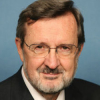Dave Obey

Dave Obey
David Ross "Dave" Obey is a former United States Representative. Obey served in the House of Representatives for Wisconsin's 7th congressional district from 1969 to 2011. The district includes much of the northwestern portion of the state, including Wausau and Superior. He is a member of the Democratic Party, and served as Chairman of the powerful House Committee on Appropriations from 1994 to 1995 and again from 2007 to 2011. He is the longest-serving member ever of the United States...
NationalityAmerican
ProfessionPolitician
Date of Birth3 October 1938
CountryUnited States of America
Whether you are from Minnesota, Wisconsin or any other Northern tier state, you are not going to like the reimbursement formula. The problem we face is that we wouldn't have that formula if a majority of the states didn't like it, and they have the majority of the votes.
I think we have to be very careful when we toss around terms like 'cut health care costs.' We would do very well to expect a cut in the rate of increase.
This is a very difficult question. If you take a look at the aging population and demographics, we are going to have a big increase in the number of health care jobs needed in the state and in the country.
It puts the provider in a situation of looking for ways to have someone else pick up a piece of the cost. As a result, every customer who has insurance ends up paying a 'hidden premium.' It simply adds to the health care cost burden.
This country owes them all a debt of gratitude. The down payment on that debt is making sure that we live up to Lincoln's charge: to care for him who shall have borne the battle, and for his widow, and his orphan.
We don't have enough people going into those fields and there is a high burnout rate in some health care professions, so it is very important that we get more people into the pipeline right now.
I have an obligation to fight and to fight hard for what I believe in and for the progressive principles that we are supposed to defend.
We need to be careful when we talk about cutting health care costs. They are not going to be reduced - what we really want to do is do is slow the rate of increase.
The NRA was one of the items that we pointed to when we added money to the labor, health and Education appropriations bill by reducing the size of the tax cut.
Experience taught me that working families are often just one pay check away from economic disaster. And it showed me first-hand the importance of every family having access to good health care.
I opposed Clinton's budget deal in 1997 because he brought in $115 billion cut in Medicare that created greater pressure for providers not to participate.
If you want quality service, you have to pay for it. You don't buy into waste. I have great misgivings about the amount of advertising that we see in the health care field, some by hospitals, a lot by drug companies.
Society as a whole is better off when information is available to the public. Whether you are talking about how to prevent disease, or about who does the best job of treating disease, it is useful to provide as much information to the public as possible.
There is a sign that hangs on my wall that says, 'What is it you want me to do to somebody else that is more important than what you want me to do for you?